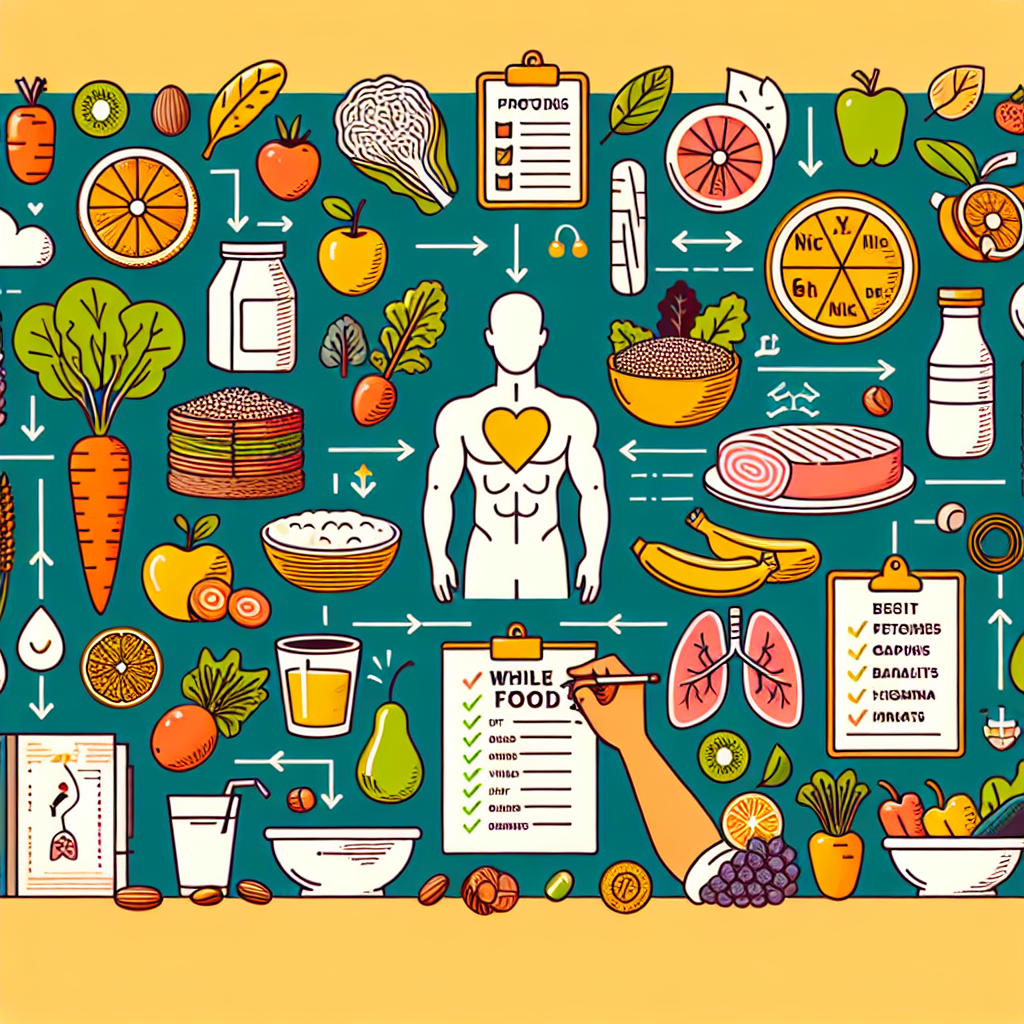In our article, “Achieving Optimal Health Through Nutrition,” we delve into the significant role nutrition plays in attaining and maintaining good health. As we explore this vital aspect of our well-being, we will share valuable insights on how proper nutrition can enhance our physical, mental, and emotional states. With an abundance of content focusing on health and wellness, this website aims to provide readers with accurate information and practical tips that they can easily incorporate into their daily lives. From debunking common myths to highlighting the benefits of specific food groups, our goal is to empower individuals to make informed choices and develop long-lasting habits that will contribute to their overall well-being. So, let us embark on this journey together, as we embark on the path to optimal health through nutrition.

The Importance of Nutrition
Proper nutrition is essential for achieving optimal health and well-being. The food we consume serves as fuel for our bodies, providing the necessary nutrients for growth, repair, and maintenance of bodily functions. By balancing our nutrient intake and fueling our bodies with the right sources of food, we can significantly improve our overall health and quality of life.
Balancing Your Nutrient Intake
Balancing our nutrient intake is crucial to ensure our bodies receive all the necessary vitamins, minerals, and macronutrients for optimal functioning. Macronutrients, such as protein, carbohydrates, and fats, provide the bulk of our energy needs and play a key role in various bodily functions. It’s important to understand the different types of nutrients and their respective functions to create a well-rounded diet.
Fueling Your Body
Fueling our bodies with the right nutrients is essential for maintaining energy levels, supporting physical activity, and promoting overall wellness. By making conscious choices about the foods we consume, we can fuel our bodies effectively and efficiently. Proper nutrition not only helps us perform daily activities but also contributes to disease prevention and promotes longevity.
Key Nutrients for Optimal Health
To achieve optimal health, it is important to understand the key nutrients our bodies need. These nutrients play a vital role in various bodily functions, including cell repair, immune system support, and hormone regulation. By incorporating these nutrients into our diet, we can ensure our bodies receive the necessary tools for optimal health.
Protein
Protein is a crucial nutrient for our bodies, as it serves as the building blocks for tissues, muscles, and organs. It is involved in numerous functions, including muscle repair, immune system support, and hormone production. Good sources of protein include lean meats, poultry, fish, eggs, dairy products, beans, and legumes. It is recommended to consume an adequate amount of protein daily to support these vital functions.
Carbohydrates
Carbohydrates are the primary source of energy for our bodies. They provide fuel for physical activity, brain function, and maintenance of vital organs. There are two types of carbohydrates: simple and complex. Simple carbohydrates, such as sugars and refined grains, provide quick energy but lack essential nutrients. On the other hand, complex carbohydrates, such as whole grains, fruits, and vegetables, provide sustained energy and essential nutrients.
Fats
Fats are an essential nutrient for our bodies, serving as a concentrated source of energy and supporting vital bodily functions. There are different types of fats, including unsaturated fats (such as olive oil, avocados, and nuts) and saturated fats (such as butter and animal fats). It is important to choose the right types of fats and consume them in moderation to maintain optimal health.
Vitamins
Vitamins are organic compounds that are necessary for our bodies’ proper functioning. They are involved in various processes, including metabolism, immune system support, and cell growth. There are 13 essential vitamins that our bodies require, including vitamin A, B vitamins, vitamin C, vitamin D, vitamin E, and vitamin K. It is important to consume a diverse range of fruits, vegetables, whole grains, and lean proteins to ensure we obtain an adequate amount of vitamins.
Minerals
Minerals are inorganic substances that play a crucial role in maintaining the balance and integrity of our bodily functions. They are involved in processes such as bone health, blood clotting, nerve function, and fluid balance. Important minerals include calcium, iron, magnesium, potassium, and zinc. Consuming a varied diet that includes fruits, vegetables, whole grains, and lean proteins can help meet our mineral needs.
Understanding Macronutrients
Macronutrients are the nutrients our bodies require in large amounts to provide energy and support bodily functions. They include protein, carbohydrates, and fats. Understanding the role and function of each macronutrient is essential for building a balanced diet.
Protein
Protein is composed of amino acids and serves as the building blocks for our muscles, tissues, and organs. It is involved in various functions, including muscle repair, immune system support, and hormone production. Consuming an adequate amount of protein is crucial for maintaining overall health and supporting an active lifestyle.
Carbohydrates
Carbohydrates are the primary source of energy for our bodies. They are broken down into glucose to provide fuel for physical activity, brain function, and other bodily functions. It is important to differentiate between simple carbohydrates, which provide quick energy but lack essential nutrients, and complex carbohydrates, which provide sustained energy and essential nutrients.
Fats
Fats are essential for our bodies’ proper functioning and provide a concentrated source of energy. They are involved in various processes, including hormone production, nutrient absorption, and insulation of vital organs. It is important to choose the right types of fats, such as unsaturated fats, and consume them in moderation to maintain optimal health.
Building a Balanced Diet
Building a balanced diet is essential for achieving optimal health and well-being. By creating a healthy plate, practicing portion control, considering meal timing, and adopting healthy snacking habits, we can ensure our bodies receive the necessary nutrients while maintaining a healthy weight.
Creating a Healthy Plate
A healthy plate is a visual representation of a well-balanced meal. It consists of different food groups in appropriate portions, including fruits, vegetables, whole grains, lean proteins, and healthy fats. By filling our plates with a variety of nutrient-dense foods, we can enhance the nutritional value of our meals and meet our body’s needs.
Portion Control
Practicing portion control is crucial for maintaining a healthy weight and meeting our body’s nutritional needs. By being mindful of serving sizes and listening to our body’s hunger and fullness cues, we can avoid overeating and ensure our meals are balanced.
Meal Timing
Meal timing refers to the frequency and distribution of meals throughout the day. It is important to fuel our bodies with regular meals and snacks to maintain proper energy levels and support bodily functions. Eating at regular intervals can also help prevent overeating and promote a healthy metabolism.
Snacking Habits
Snacking can be a healthy and necessary part of our dietary routine, as long as we make mindful choices. Opting for nutrient-dense snacks, such as fruits, vegetables, nuts, and yogurt, can provide our bodies with essential vitamins, minerals, and macronutrients. Avoiding highly processed and sugary snacks is important for maintaining a balanced diet.

The Role of Protein
Protein plays a crucial role in our bodies and is involved in various functions that are essential for optimal health and well-being. Understanding the functions of protein, recommended protein intake, and sources of protein can help us incorporate this nutrient into our diet effectively.
Functions of Protein
Protein serves as the building blocks for our muscles, tissues, and organs. It is involved in muscle repair, immune system support, hormone production, and enzyme production. Protein also plays a vital role in maintaining healthy hair, skin, and nails. By consuming an adequate amount of protein, we can support these vital functions and promote overall health.
Recommended Protein Intake
The amount of protein our bodies require depends on factors such as age, gender, activity level, and overall health. The Recommended Dietary Allowance (RDA) for protein is approximately 0.8 grams per kilogram of body weight for adults. However, athletes, pregnant women, and individuals with certain medical conditions may require higher amounts of protein. It is important to consult with a healthcare professional to determine the appropriate protein intake for individual needs.
Sources of Protein
Protein can be obtained from both animal and plant sources. Animal sources of protein include lean meats, poultry, fish, eggs, and dairy products. Plant sources of protein include beans, legumes, nuts, and seeds. By including a variety of these protein sources in our diet, we can ensure we meet our body’s protein needs while enjoying a diverse range of flavors and textures.
Choosing the Right Carbohydrates
Carbohydrates are a vital part of our diet, providing essential energy for our bodies and supporting various bodily functions. It is important to differentiate between simple and complex carbohydrates and understand the concept of the glycemic index to make informed choices about carbohydrate sources.
Simple Carbohydrates
Simple carbohydrates, also known as sugars, are composed of one or two sugar molecules and are quickly absorbed into the bloodstream. They provide a rapid source of energy but lack essential nutrients. Examples of sources of simple carbohydrates include table sugar, honey, maple syrup, fruit juices, and sweets. While they can provide quick energy, it is important to consume them in moderation and prioritize complex carbohydrates in our diet.
Complex Carbohydrates
Complex carbohydrates are composed of three or more sugar molecules and are broken down more slowly in the body, providing sustained energy. They are a rich source of vitamins, minerals, and dietary fiber. Examples of complex carbohydrates include whole grains, legumes, fruits, vegetables, and starchy foods such as potatoes and corn. Incorporating complex carbohydrates into our diet helps provide essential nutrients and long-lasting energy.
The Glycemic Index
The glycemic index is a measure of how quickly a carbohydrate-containing food raises blood sugar levels. Foods with a high glycemic index raise blood sugar quickly, while foods with a low glycemic index raise blood sugar more slowly and steadily. Choosing lower glycemic index foods, such as whole grains, can help maintain stable blood sugar levels and provide sustained energy throughout the day.
Understanding Dietary Fats
Dietary fats play a vital role in our bodies and are necessary for optimal health and well-being. By understanding the different types of fats, distinguishing between good and bad fats, and consuming fats in moderation, we can prioritize our fat intake for optimal health.
Types of Fats
There are different types of fats, including saturated fats, monounsaturated fats, polyunsaturated fats, and trans fats. Saturated fats are typically found in animal products and some tropical oils, and consuming them in excess can increase the risk of heart disease. Monounsaturated fats and polyunsaturated fats, found in foods like olive oil, avocados, and fatty fish, are considered heart-healthy and can provide essential nutrients. Trans fats, found in processed and fried foods, should be avoided as they increase the risk of heart disease.
Good Fats vs. Bad Fats
There is a distinction between good fats and bad fats based on their impact on health. Good fats, such as monounsaturated fats and polyunsaturated fats, offer numerous health benefits and are considered essential for our bodies’ proper functioning. Bad fats, such as saturated fats and trans fats, can have detrimental effects on our health when consumed in excess. It is important to choose the right types of fats and limit our intake of unhealthy fats.
Recommended Fat Intake
The American Heart Association recommends that adults should aim for a dietary fat intake that constitutes 20-35% of their total daily calories. It is essential to prioritize the consumption of healthy fats, such as monounsaturated fats and polyunsaturated fats, while limiting the intake of saturated fats and trans fats. By maintaining a balanced fat intake, we can support our bodily functions and reduce the risk of various diseases.
The Power of Vitamins and Minerals
Vitamins and minerals are essential nutrients that our bodies require in small amounts but play a significant role in maintaining optimal health. By understanding the essential vitamins and important minerals, we can ensure we meet our body’s micronutrient needs.
Essential Vitamins for Health
Vitamins are organic compounds that our bodies require in small amounts to support various bodily functions. There are 13 essential vitamins, including vitamin A, B vitamins, vitamin C, vitamin D, vitamin E, and vitamin K. Each vitamin has a specific role, such as promoting vision (vitamin A), supporting energy production (B vitamins), and boosting immune function (vitamin C). Consuming a varied diet that includes fruits, vegetables, whole grains, and lean proteins can help us obtain the necessary vitamins for optimal health.
Important Minerals for the Body
Minerals are inorganic substances that are necessary for our bodies’ proper functioning. They play a crucial role in processes such as bone health, blood clotting, nerve function, and fluid balance. Important minerals include calcium, iron, magnesium, potassium, and zinc. Consuming a diverse range of foods, including fruits, vegetables, whole grains, and lean proteins, can help us meet our mineral needs and support optimal health.
Meeting Your Micronutrient Needs
To meet our body’s micronutrient needs, it is important to consume a varied and balanced diet that includes a wide range of nutrient-dense foods. Fruits, vegetables, whole grains, lean proteins, and dairy products are excellent sources of essential vitamins and minerals. While it is possible to obtain many of these nutrients through diet alone, some individuals may benefit from supplementation. It is important to consult with a healthcare professional before starting any vitamin or mineral supplementation.
The Impact of Water on Health
Water is a vital component of our bodies and plays a crucial role in maintaining optimal health. Staying hydrated is essential for various bodily functions and can have a significant impact on overall well-being.
Health Benefits of Hydration
Staying adequately hydrated has numerous health benefits. Water supports digestion, nutrient absorption, temperature regulation, joint lubrication, and the removal of waste products from the body. It also helps maintain proper blood volume, supports cardiovascular health, and enhances cognitive function. By staying hydrated, we can optimize our body’s functions and promote overall wellness.
Daily Water Intake Recommendations
The daily water intake recommendations vary depending on factors such as age, gender, activity level, and climate. The National Academies of Sciences, Engineering, and Medicine recommend a daily water intake of about 3.7 liters (or about 15 cups) for men and approximately 2.7 liters (or about 11 cups) for women. These recommendations include water from beverages and food sources. It is important to listen to our body’s thirst cues and adjust our water intake accordingly.
The Benefits of Fiber-Rich Foods
Dietary fiber is a type of carbohydrate that our bodies cannot digest. Despite this, it plays a vital role in maintaining optimal health and well-being. By understanding the importance of dietary fiber, the benefits of a high-fiber diet, and the sources of fiber, we can prioritize its consumption in our diet.
Importance of Dietary Fiber
Dietary fiber offers numerous health benefits and is important for the proper functioning of our digestive system. It adds bulk to our stool, promotes regular bowel movements, and helps prevent constipation. Fiber also helps control blood sugar levels, lower cholesterol levels, and maintain a healthy weight. By including fiber-rich foods in our diet, we can support our overall health and well-being.
Benefits of a High-Fiber Diet
Consuming a high-fiber diet has numerous advantages for our health. It can help prevent and manage chronic diseases such as heart disease and type 2 diabetes. High-fiber foods promote satiety and can aid in weight management by reducing hunger and calorie intake. Additionally, a high-fiber diet supports digestive health, promotes a healthy gut microbiome, and enhances nutrient absorption. By prioritizing fiber-rich foods, we can reap these benefits and support our overall well-being.
Sources of Fiber
Fiber can be obtained from various food sources, including fruits, vegetables, whole grains, legumes, nuts, and seeds. Fruits such as apples, bananas, and berries are excellent sources of fiber. Vegetables such as broccoli, carrots, and leafy greens are also rich in fiber. Whole grains, such as oats, quinoa, and brown rice, are an excellent source of fiber. Legumes, nuts, and seeds also offer a significant amount of dietary fiber. By incorporating these foods into our meals and snacks, we can boost our fiber intake and support our digestive health.
In conclusion, nutrition plays a vital role in achieving optimal health and well-being. By balancing our nutrient intake, fueling our bodies with the right sources of food, and understanding the importance of various nutrients, we can significantly improve our overall health. By building a balanced diet, incorporating key nutrients such as protein, carbohydrates, fats, vitamins, and minerals, and paying attention to factors such as portion control, meal timing, and snacking habits, we can support our body’s functions and promote optimal health. By also recognizing the significance of water, fiber-rich foods, and making informed choices about fats and carbohydrates, we can enhance our overall well-being and lead a healthy lifestyle.

